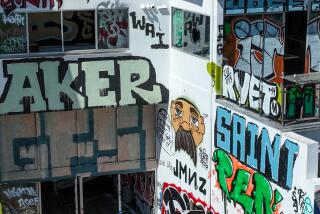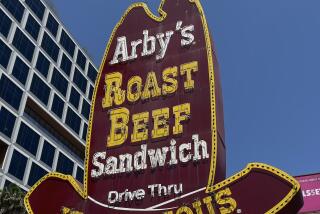Part Comedy, Part Mystery, Part Hype
- Share via
This wasn’t a Hollywood event.
Really. It could have happened anywhere.
The QVC home shopping network enlisted veteran show business trouper Debbie Reynolds to announce Thursday that the network was going to host a sort-of-but-not-really auction to raise $100,000 for the maintenance of the famed Hollywood sign in the hills above Los Angeles.
In an era when such awkward coinages as “the Rose Bowl as Presented by AT&T;” are the rule, the notion that some corporation might be willing to purchase an association with the movie industry’s best-known and best-loved icon makes sense, especially since the money would be used for the worthy purpose of keeping the sign in good shape.
So it might have happened anywhere--anywhere, at least, where a celebrity who is, as Reynolds immodestly put it, “on the down side of the wheel,” would be willing to perch on a pillow on a tall chair on a lip of land high on a hill above the Hollywood Reservoir and conduct what is known in the business as a satellite media tour and serial interviews with 22 television and radio stations scattered from here to hereafter, and in the course of those 22 interviews smile and make jokes about everything from multiple marriages to her makeup and then ask for some well-meaning corporation to come forward with good will in one hand and a check for $100,000 in the other and donate both to maintain a sign that doesn’t need to be maintained.
QVC has scheduled two shows on its cable channel later this month for the solicitation of the $100,000.
The first caller with the money gets the right to become the sign’s sponsor, a QVC spokeswoman said. Unless, another spokeswoman said, somebody else offers more, which led to all sorts of confusion, including the circulation of news reports that the sign was somehow for sale.
This reached the ears of Mayor Richard Riordan who, in high dudgeon, announced that the sign, which the city owns, “is not for sale, rent or adoption. . . . It has no price tag. It cannot and will not be sold to the highest bidder.”
Chris Baumgart, chairman of the Hollywood Sign Trust, which would receive the $100,000, cautioned that the trust had no intention of selling the sign.
“This is similar to adopting a highway,” Baumgart said. “What it’s not doing is selling the sign or the licensing rights to the logo.”
What it’s also not doing, he said in response to questions, is necessarily raising money to take care of the sign.
The sign was built in 1929 as a real estate promotion, rebuilt in 1975 and repainted and fully restored in 1995. Since the latter event and the subsequent installation of a video security system, little money has been needed for maintenance. Most damage to the sign over the years was done by vandals. This has been virtually eliminated by the security system.
Currently, in fact, there is no maintenance needed or scheduled for the sign, Baumgart said.
The Hollywood Sign Trust that Baumgart chairs is an offshoot of the Hollywood Chamber of Commerce. The trust is charged with maintaining the sign and promoting Hollywood. The money, if somebody decides to donate it, would be spent to accomplish the general purposes of the trust, and not be specifically earmarked for the sign, Baumgart said.
It would, in other words, be used for promotion.
This sort of thing drives the critics of the Hollywood chamber nuts.
Gerald Schneiderman, a Hollywood real estate agent and one of those critics, said the chamber uses its trust funds irresponsibly.
“Sign trust money has been used as a slush fund,” he said Thursday.
It says something about a place--who knows what?--that its best-known landmark is a sign, an advertisement for itself.
It says something, too, that the promotion of Hollywood would rely on charity, Hollywood being the industry in which money flows like beer at a baseball game, and in which a prominent CEO’s annual compensation was announced recently as topping $500 million.
This whole thing was the brainchild not of the people who own the sign, but of a television shopping network.
QVC came to the trust with the idea, Baumgart said.
The network thought it was a good thing to do for the sign and, yes, it “might bring new viewers to the network,” a spokeswoman said.
In the end then, what the sign affair amounts to is two blocks of programming.
OK, maybe it couldn’t have happened anywhere.
More to Read
The biggest entertainment stories
Get our big stories about Hollywood, film, television, music, arts, culture and more right in your inbox as soon as they publish.
You may occasionally receive promotional content from the Los Angeles Times.










